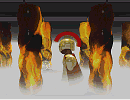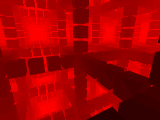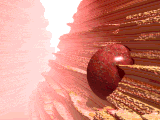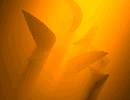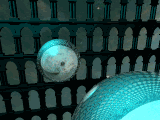Pia Fraus [Latin] - Pious Fraud
Truth endures not in dogma, but in the quiet of a seeking heart. - Christian Lehrer, Lyceum Archives
The Reluctant Chronicler
In the orbiting stillness of Laurasia, where Earth’s blue arc glowed against the void, Christian Lehrer penned chronicles that wove the fragile tapestry of New Pangea—a global village born from the Global Revolution’s uneasy peace. As grandson of Dietrich Lehrer, the reluctant visionary who starved corruption with robotics, Christian was no mere heir to the Lehrer/Sheen empire. An evangelist who shed religion’s dogma yet clung to a quiet faith, he became a chronicler whose words, preserved in the Lyceum, captured New Pangea’s rise and fall for the survivors of Verdant Rim. As a captain of Laurasia, he witnessed humanity’s dreams unfold, his writings questioning their permanence in the light of truths beyond human systems.
Christian’s journey began far from the Lehrer/Sheen empire, shaped by his father David’s departure from the family’s robotics dynasty to pursue a devout Christian life. Raised in a world apart from Dietrich’s Galesburg estate, Christian knew his grandfather only through his absence, until an anonymous $200 million donation—later traced to Dietrich—funded Pathway Ministries, his global megachurch. Its studios broadcast sermons, music, and podcasts worldwide, the stage a spectacle of towering displays, live bands, and dazzling effects. Yet Christian grew disillusioned, seeing his flock’s craving for entertainment over truth, a realization deepened by a personal secret that left him feeling like a pious fraud. Rejecting evangelism’s hypocrisy, he turned to chronicling New Pangea’s secular rise, his intolerance for religion surpassing Dietrich’s apathy.
Christian grew up in Galesburg, Illinois, where the Lehrer/Sheen estate stood as a museum of a family legacy he barely knew, his father David having forsaken it for faith. As a child evangelist preaching on Galesburg’s streets, Christian drew crowds with fervor, but by seventeen, an anonymous $200 million donation—later traced to Dietrich—transformed his ministry into Pathway Ministries, a global megachurch generating vast wealth. He repaid Dietrich swiftly, the funds fueling a spectacle that rivaled the era’s grandest shows, yet left him questioning its truth. Accessing Lehrer/Sheen’s legacy through MOST’s digital archives, he studied Turnverein journals and 1848 revolutionary records, seeking a deeper truth beyond dogma’s grasp. His Lyceum chronicles, etched on a tablet linking Laurasia’s passengers to Earth, captured New Pangea’s rhythm—growers sharing seeds, guides mentoring in learning circles, robots serving without greed—his secular focus distancing him from Raymond Sheen’s Pathway Machine, though a faint spark of faith lingered in his words.
The Global Revolution, a tempest of rage and renewal, tested Christian’s resolve as he boarded Laurasia at nineteen, joining his grandfather Dietrich, whose presence was a rare bridge to the Lehrer/Sheen legacy. Both served as captains of the station, Christian’s six-month tenure following Dietrich’s, though the archives obscure their sequence. From Laurasia’s labs, alongside figures like Akio Tsukino and Kacela Adesina, Christian observed the Ministry of Science and Technology (MOST) forge New Pangea’s global village. Robots delivered food, medicine, and tools without currency, while maglev trains wove continents together. Learning circles, tailored to each mind, freed education from dogma, nurturing curiosity. His Lyceum chronicles, etched on a tablet linking passengers to Earth, framed these shifts as fragile experiments, noting growers tending fields for joy, guides teaching children to question, and robots serving without greed, yet he saw cracks—some hoarded worthless wealth, others whispered of The Academy’s schemes to resurrect old corruptions.
Laurasia, a Lehrer/Sheen-built marvel, was New Pangea’s nerve center, its labs humming with MOST’s algorithms. Christian’s captaincy, one of several rotating stints, followed Akio’s pioneering command and Dietrich’s brief tenure, though the archives blur their sequence. From the station’s decks, he chronicled a global village where individuals chose old crafts or new roles, freed from labor’s grind. His Lyceum entries, shared with Raymond Sheen—the android/part-human Dietrich inspired—blended practical observations with reluctant spiritual musings. Where Raymond sought answers in Bible data, Christian focused on New Pangea’s mechanics: a grower’s garden, a guide’s lesson, a robot’s silent service. Yet his words hinted at a rekindling faith, a question of whether systems alone could endure.
Christian’s time on Laurasia sharpened his perspective. Orbiting above a world remade, he saw New Pangea’s promise—cultures blending, faiths coexisting—but sensed its fragility. Whispers of The Academy’s longing for old power, or hints of an unwritten calamity, shadowed his chronicles. The Lyceum, linked to MOST’s pre-Great Destruction archives, preserved his words for Earth’s survivors. His entries, analytical yet laced with hope, questioned whether human systems needed a deeper anchor, though he left that anchor unnamed, his faith a private struggle against his own intolerance.
By Verdant Rim’s time, when a Lehrer girl sifted through the rubble of a world undone, Christian’s chronicles endured in the Lyceum, alongside Raymond’s data. The device, once a passenger’s link to Earth, became the essence of the Pathway Machine—a record of New Pangea’s dreams and failures. Christian, long gone, left no sermons but a secular record of a world that tried to starve its dragons, only to find them lurking. His legacy, preserved by machines, guides those who seek beyond, their questions echoing his own in a world of ruins.



